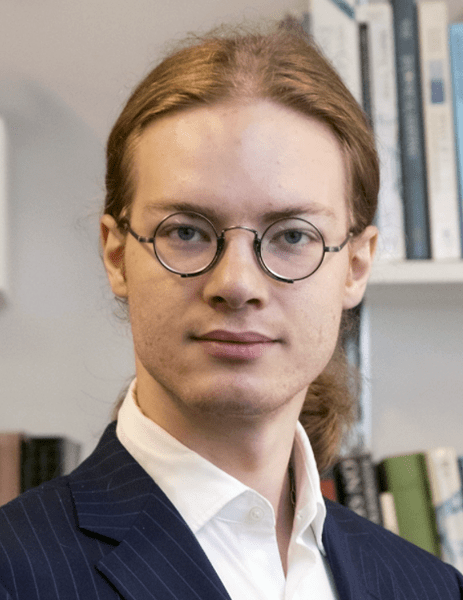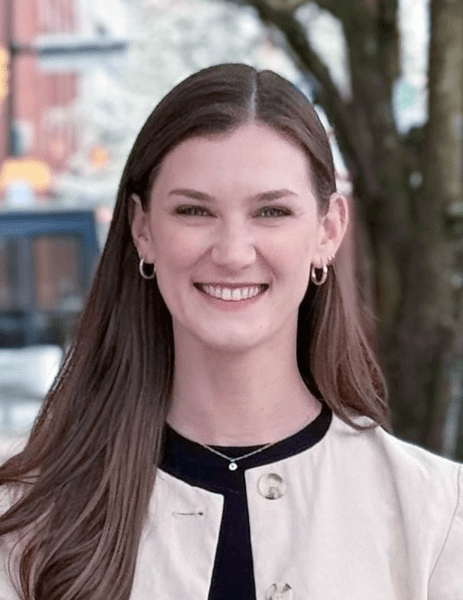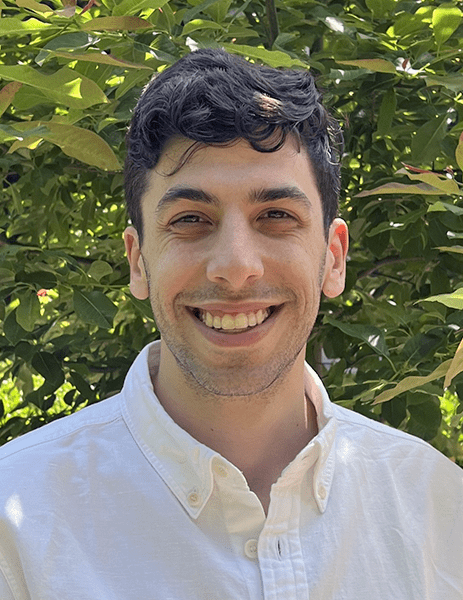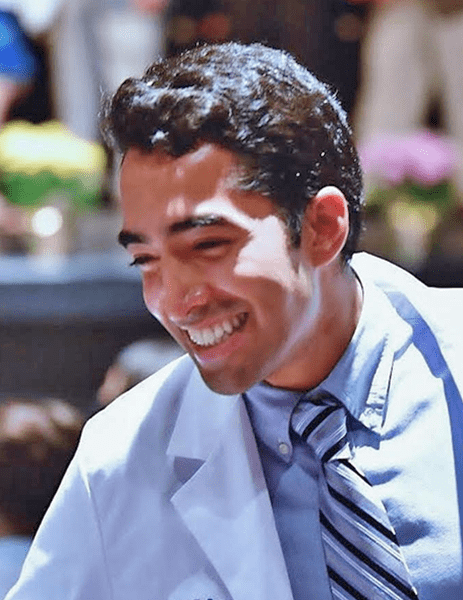Dietrich Students Awarded Fulbright Scholarship
Four Dietrich Fulbright scholars will address projects around the globe
By Rebecca Kane
This year, four students from Dietrich College were awarded with Fulbright scholarships. This honor is bestowed to extraordinary college seniors, graduate students and young professionals who focus on international relations within their field of study. Awardees have the opportunity to pursue graduate school, conduct research or teach English abroad. The program’s overarching goal is to facilitate cultural exchange by immersing awardees in their respective host country’s culture, beliefs, classrooms and daily tasks.
Adrian Lapadat
 Adrian Lapadat (DC 2023) graduated with a master of arts in professional writing and was awarded the Fulbright scholarship to conduct research on emigration from Bacău county in Romania.
Adrian Lapadat (DC 2023) graduated with a master of arts in professional writing and was awarded the Fulbright scholarship to conduct research on emigration from Bacău county in Romania.
“Many Romanians, like my parents, leave to work abroad,” said Lapadat. “Most don't come all the way over to the United States, but that distance is still something that's very hard to cope with, both for those who leave and those who stay behind.”
Lapadat plans to conduct a series of interviews to shed light on the material and psychological impact of emigration on those who stay in the home country. He likens this to a qualitative psychological research approach that also has a linguistic component.
Lapadat’s goal is to use his writing and research skills to conduct thorough research into this matter and craft more creative accounts of these emigration stories.
“I'm interested in applying my writing and research skills to something I care about,” said Lapadat. “Mass emigration doesn't just affect countries like Romania . . . it has large consequences for countries like Bulgaria, Serbia — really, the entire Balkan region.”
Devon Renfroe
 Devon Renfroe, who earned her master of arts in applied second language acquisition from the Department of Languages, Cultures & Applied Linguistics at CMU, plans to continue her passion for the Korean language as part of her Fulbright experience.
Devon Renfroe, who earned her master of arts in applied second language acquisition from the Department of Languages, Cultures & Applied Linguistics at CMU, plans to continue her passion for the Korean language as part of her Fulbright experience.
After graduation, Renfroe moved to Korea and taught English in a middle school while simultaneously teaching herself Korean.
“I found that learning the language allowed me to embody these different identities that I don’t have access to in English,” said Renfroe. “I can be someone in a Korean context that I can’t be in English—that whole process was really meaningful to me.”
As a result of this experience, Renfroe realized that she wanted to combine her love of teaching with her newfound interest in the Korean language.
She plans on studying how the Korean language is structured around the relational aspects of communication.
“Korean is a language that has a really complex and interesting honorific system […] the way you choose which of these features to use [these relational factors of the language] have a really big impact on how you relate to other people,” said Renfroe. “I want to analyze how first–language and second–language Korean speakers relate to each other and interact with each other using these specific features of the language.”
Renfroe plans to fold her teaching experience and her time in Korea into a Ph.D. project to explore how learning a language can be a transformative experience.
“This project will hopefully be my dissertation,” she said. “The idea is to — through mostly recorded conversations between first–language Korean speakers and second–language Korean speakers — analyze how they use particular features of the language, which are called honorifics.”
Renfroe will be conducting her study at Chonnam National University.
“I love teaching, and I love language so much that it’s always been fun to be in a classroom where that’s the center of attention,” said Renfroe. “Language is such a powerful tool for people to understand each other cross-culturally.”
Matthew Turetsky
 Matthew Turetsky, a Ph.D. student in the History Department, will conduct research regarding the cultural, social and economic factors surrounding the history of quinoa.
Matthew Turetsky, a Ph.D. student in the History Department, will conduct research regarding the cultural, social and economic factors surrounding the history of quinoa.
Quinoa holds a special place in Turetsky’s mind and heart. He traveled to Peru in 2019 and encountered agricultural displays in the many small villages. Unlike the homogenization found in supermarkets in the West, the displays highlighted the diversity of crops grown in the region.
“The colors [of the different quinoa varieties] captivated me right away,” said Turetsky. “From then on, I was fascinated by this question and the issue of diversity of crops.”
These lingering questions increased his curiosity. When the opportunity of the Fulbright award came along, he knew what he wanted to study. He received funds for three months of research in Bolivia and seven months of research in Peru.
“My research focuses on the conservation and commodification of quinoa,” he said. “Peru and Bolivia are the two most prominent countries that are producing [quinoa] today, and for centuries have been the leading producers — and until about the 1980s and 1990s, it was a subsistence crop. It only recently became an international food as we know it today.”
According to Turetsky, the recent buzz surrounding quinoa is what drove him to focus particularly on this crop.
Turetsky aims to use his Fulbright award to further investigate and answer the questions surrounding how farmers in the region managed to conserve the diverse varieties of quinoa in the face of changing economic, political and social conditions in the 20th century, mainly from the 1930s to the 80s.
Shaun Ranadé
 Shaun Ranadé, an alumnus of three CMU colleges, will be headed to Nepal for his Fulbright project. He graduated in 2016 with a master’s degree in biomedical engineering, and before that, he earned two bachelor’s degrees — one in biological sciences and the other in Japanese studies. He is currently a third-year medical student in New York.
Shaun Ranadé, an alumnus of three CMU colleges, will be headed to Nepal for his Fulbright project. He graduated in 2016 with a master’s degree in biomedical engineering, and before that, he earned two bachelor’s degrees — one in biological sciences and the other in Japanese studies. He is currently a third-year medical student in New York.
In Nepal, Ranadé will treat gestational diabetes by implementing continuous glucose monitoring. Nepal has a 20% higher rate of gestational diabetes than neighboring countries, and the government has prioritized treating it, which made it an ideal place for him to implement telemonitoring to improve the health of mothers and infants. In addition, he has local connections to the area, so he looks forward to seeing its natural beauty and participating in cultural and religious festivals.
He was very involved in the CMU community during his time as a student: beyond his three degrees, he also co-founded CMU’s chapter of Global Public Health Brigades. He believes “medical knowledge, cultural competence and compassion are essential for effective physicians,” and this ethos has informed his degree choices and other activities, including this Fulbright.
Ranadé says his interdisciplinary CMU experience across three colleges prepared him for his work, which has not just included medical school, but also in fields such as biotechnology investment consulting, biotechnology intellectual property law and in cellular therapeutics research and development.
“The supportive environment and rigorous curriculum have equipped me with the skills and confidence to engage with key opinion leaders, subject matter experts, and practicing physicians,” he says. “Receiving the Fulbright Scholarship is a recognition of my continued commitment to serving others through healthcare and as a future physician.”